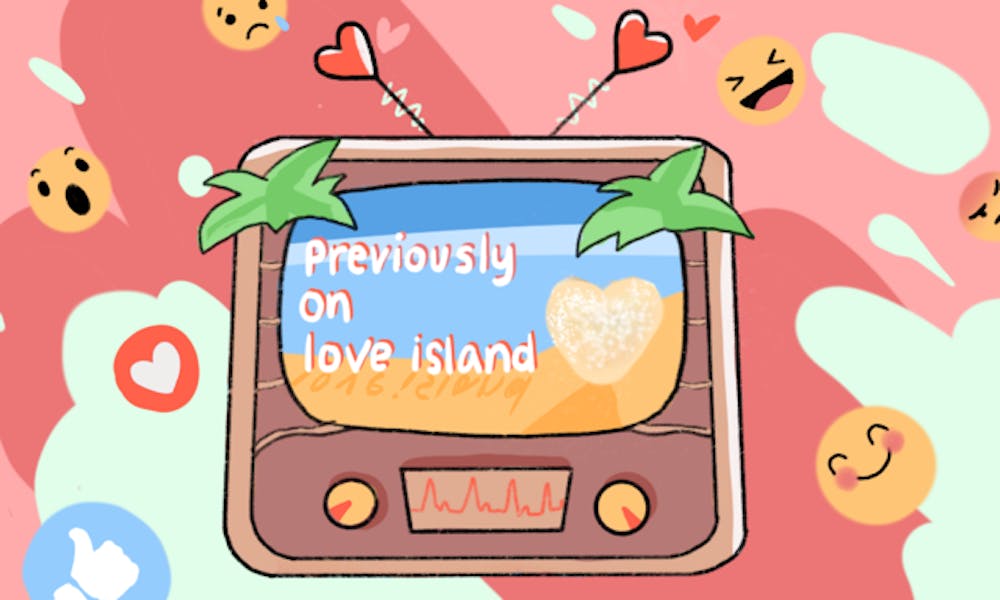Reality television is in a weird place right now. The genre, predicated on the idea of reality, has been exposed as being entirely false. In the time since the original release of shows like The Hills and The Bachelor, stars and producers have come forward admitting to the falseness of what we see onscreen (Lauren Conrad even wrote a YA series detailing how little truth there is to reality TV).
As a result, viewers don’t really care about narrative—we know that whatever we’re watching has been manipulated for our viewing pleasure. Instead, we care about the characters. And in worlds driven by character drama, the arcs found in reality TV tend to be artificial: who is taking advantage of the show for the wrong reasons? What are their intentions? What did they say off–camera, behind our backs? We are obsessed with hints of truth, jumping to conclusions and guessing at who can be trusted. Enter: Love Island, a show that broadcasts its un–reality in every way.
And ironically, that unreal–ness is what makes it feel so real. The British ITV2 show is like Bachelor in Paradise on steroids—it’s a dating show turned up to the extreme for everyone’s enjoyment. From revelatory “challenges” designed to expose contestants to the microphones that hang prominently from the participants’ necks, viewers are bluntly and constantly reminded that that Love Island is made for TV. Now, courtesy of CBS, Love Island has been brought across the pond to U.S. audiences. And though the American spinoff is nowhere near as beloved as the British original, a second season has already been ordered. This means that on some level, network executives believe in its potential for profit and ratings. So what is it about Love Island? How do we explain its success?
Here’s its basic premise: attractive women and men are invited to the Island. The contestants have to pair up or ship out. And, as the days pass, the ways in which contestants are eliminated become increasingly involved: audience vote, the introduction of a newer, hotter contestant, and even forced splits of couples. This contrived, heteronormative format might seem derivative in nature, but it never plays out that way onscreen. Given the short time frame in which the couples must choose partners, genuine intimacy might seem an almost impossible feat. But sexual attraction, a lack of privacy, and a chance at fame force contestants to make it work.
Airing every day throughout the summer, Love Island has little—if any—time to manufacture drama. Oftentimes what’s shown onscreen feels totally unfiltered, as though we are actually watching people fall in and out of love. And in a lot of ways, we are: there’s nothing to do in the Love Island villa except fall in love. Contestants aren't allowed access to books, movies, or even a pen and paper. The Love Island villa is like an alternate universe wherein everything is distinctly brighter: walls painted with neon words, matching chartreuse and fuchsia bed linens, all existing in a manicured villa with fake grass in the middle of Majorca.
Watching Love Island is a distinctly Machiavellian experience. It mirrors The Truman Show so closely that the 1998 movie could've been the direct inspiration for the series. We watch as contestants lie and misremember details we saw just moments before, all the while waiting for the truth to come out. But it never does. The producers never seem to interfere in the ways that matter. There are the 73 in–house cameras and the conspicuous microphones, but that's it. Our watchful eyes are the only intrusive presence. It's always bizarre to see the way people will behave when they know they're being watched, but it's even more bizarre to see how they act when they forget they're being watched. And, as everything unfolds in front of us, we become frustrated with how warped the sense of reality seems to be in the villa. Even with all the on–air confusion, there’s no falsity for us on the outside—we know what’s happening the whole time.
We have the distinct sense that it's wrong to watch, but the draw of schadenfreude is too great to ignore. These lives fall apart in front of us, and we drink it in. Every last bit. Because no matter how confused the contestants' ideas of truth becomes, ours stays the same. We always get exactly what we want: the truth, the drama, and the intrigue.
And in some ways, that makes it the perfect show for today. It is rare that we know exactly what we’re getting or how we’re getting it. So in an age of deep–fakes, false narratives, and real deceit, the simplicity of Love Island is relaxing, comforting even.

